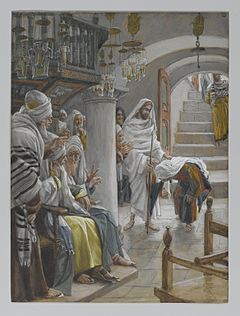On one occasion when Jesus was going to the house of a
leader of the Pharisees to eat a meal on the Sabbath, they were
watching him closely. When he noticed how the guests chose the places
of honor, he told them a parable. ‘When you are invited by someone
to a wedding banquet, do not sit down at the place of honor, in case
someone more distinguished than you has been invited by your host;
and the host who invited both of you may come and say to you, “Give
this person your place”, and then in disgrace you would start to
take the lowest place. But when you are invited, go and sit down at
the lowest place, so that when your host comes, he may say to you,
“Friend, move up higher”; then you will be honored in the
presence of all who sit at the table with you. For all who exalt
themselves will be humbled, and those who humble themselves will be
exalted. He said also to the one who had invited him, ‘When you
give a luncheon or a dinner, do not invite your friends or your
brothers or your relatives or rich neighbors, in case they may invite
you in return, and you would be repaid. But when you give a banquet,
invite the poor, the crippled, the lame, and the blind. And you will
be blessed, because they cannot repay you, for you will be repaid at
the resurrection of the righteous.’ (Luke 14: 1, 7-14)

Here's something I
love about Jesus: unlike his bug-eating mentor, John the Baptist,
Jesus liked to eat. Dinner parties and eating out were big
with him (see Matthew 11:19), and some of his best stuff comes as
table talk. To me, there's not a lot in this world that's better than
sharing a meal and interesting conversation with people you like.
Last week I had
about an hour to kill before officiating a funeral, so I decided to
stop at the local Dunkin Donuts and clog my arteries a bit. This
particular Northeast Philly Dunkin D is conveniently located between
the funeral home and the local hospital so when the patrons collapse
from coronaries--brought about by the excess of sugar and fat--there's
less of a commute.
The doughnut shop
was jammed with patrons. I guess Monday mornings are official “Old
Retired Dudes Day" at this particular establishment. At every
table sat groups of old guys ( I mean, older than me— the
standard by which I judge maturity). They were heavy-set, blue
collar, gruff-voiced, Philly guys. They didn't bother to shave. They
joked and laughed and tried to out-talk each other. They wore
sweatshirts with Philadelphia sports logos and baseball caps—many
of which identified the wearers as US military veterans.
“Yo! Father!”
one of the guys yelled to me in a playful voice. “Will you come
over here and bless this guy?” He pointed to a slightly embarrassed
codger at his table. “He's totally full of crap and he needs all
the help he can get!”
I walked over to
the table. “Does he just need an anointing,” I asked, “or are
we talking a full-on exorcism?”
They all laughed.
I had been accepted.
I ordered my
coffee and a doughnut and began to take the lowest seat—the only
vacant table in the place. It was a small table in the rear of the
shop which two old gents had just vacated. I had about a half hour to
get caught up on some reading, but my coffee break was soon
interrupted by the arrival of two more retirees.
“Pardon me,
Father,” said one, “but could we share your table?” I couldn't
very well refuse as there were no other seats available in the whole
shop. So I made the acquaintance of Jack and Larry. Larry suggested
to his friend that, as a clergyman was their table guest, they had
better watch their language. He then told me a clean version of a
dirty joke I'd heard thirty years ago. I smiled, but I confessed I'd
thought the joke funnier in it's original incarnation. The ice was
broken.
For the next half
hour I shared the most delightful and meaningful conversation about
faith, ecumenism, and the place of the church in political debate. I
also had the chance to hear quite candidly what these two elder
statesmen expected from their congregations, worship experiences, and
clergy. I rarely get such honesty from my own parishioners. I felt
truly honored.
As we parted,
Larry remarked, “Ya know, I get the feelin' you didn't become a
pastor at age twenty-two. Bet you did something else first. Am I
right?”
“You are
correct, Sir,” I said, “and that's the nicest compliment I've
received all week.”
How exalting it is
to be treated like a regular guy.
*
* *
In this
Sunday's gospel Jesus gives us some tips on good manners. He teaches
us how to be good guests and good hosts.
(Hey!
Did you hear this one? The Virgin Mary says to the eleven-year-old
Jesus, “Son, get your elbows off the table! Where are your manners?
Were you born in a barn?” Okay. Dumb joke. I won't do it gain.)
In the
world of the gospel text, honor and shame were pretty darn big
issues. They could have economic ramifications for an entire family.
Even today, self-help gurus encourage us to elbow our way to the
places of honor, to blow our own horns, and make our achievements
known—and woe to anyone who fails to acknowledge our
accomplishments! But Jesus counsels the virtue of humility.
I once
had a high school teacher who said he preferred honest arrogance to
false modesty. I don't like arrogance of any kind, honest or not. As
a Christian, I'm taught to embrace honest modesty—the knowledge
that I have sinned and fallen short of the glory of God, and that all
the things I think make me hot stuff are just ephemeral. My
self-worth comes from feeling the love of the Creator God, and
knowing that, undeserving as I am, I am given blessings every single
day if I will only open my selfish eyes and see them. From the seat
of humility we learn to be accepting and grateful, and we're
protected from the disappointments of our own puffed-up egos.
Good
manners also mean a sense of graciousness. Grace is the gift which
comes undeserved. As hosts, we serve graciously to those who couldn't
possibly repay our hospitality. If we welcome with the expectation of
some kind of return, we are not so much practicing grace but
commerce.
* *
*
I'd
like to suggest a change in our liturgical etiquette if I may. As the
celebrant at mass, I always believe in serving the congregation
first, the worship assistants second, and myself last. I mean,
wouldn't you think me rude if, as head of the table at a dinner
party, I served myself first? I'd like to see our liturgical
practices reflect this common courtesy. And, of course, I make a
point of welcoming everyone to the table—at least everyone
who feels they can receive the Lord's body and blood in good faith.
How rude to invite someone to your home and not offer them something
to eat!
And to that end, I still invite you,
dear Reader, to sign my petition asking Pope Francis consider open
communion with Lutherans. Yeah, I know. The Cubs will win the pennant
before I get a response from the Vatican on that issue. But we
can hope, can't we? Just click here. Thanks for stopping in!

